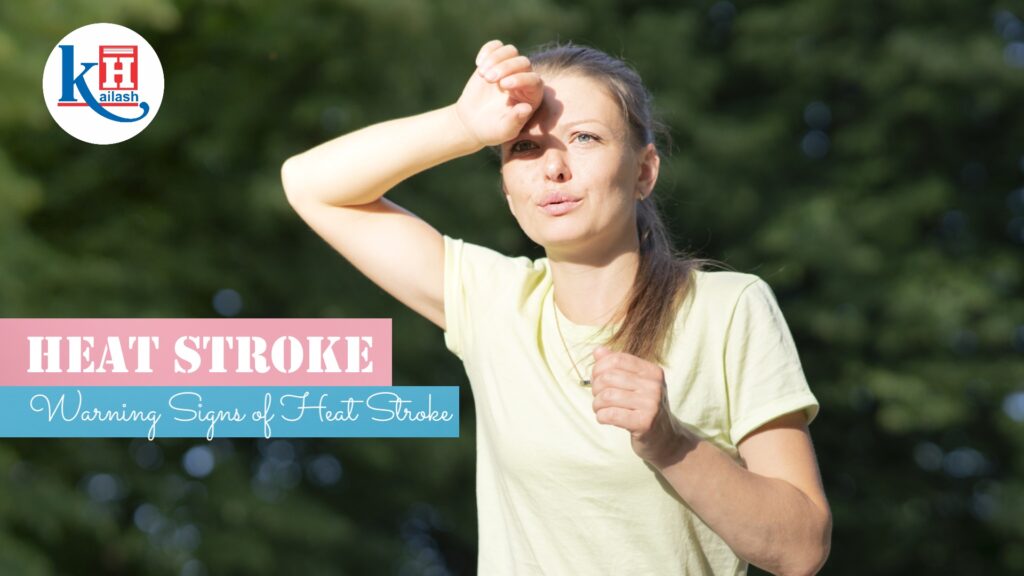As we approach the summer season, it’s essential to understand the risks associated with extreme heat exposure. One of the most severe heat-related illnesses is heat stroke, which can be life-threatening if not treated promptly. Heat stroke occurs when the body’s temperature regulation mechanisms fail, causing the body temperature to rise rapidly. In this article, we will discuss the prevention of heat stroke and provide tips for staying safe in hot weather.

What is Heat Stroke?
Heat stroke is a serious and potentially life-threatening condition that can occur when the body’s internal temperature rises to a dangerous level. It is considered a medical emergency, and prompt medical attention is required to prevent serious complications. Heat stroke is often caused by prolonged exposure to high temperatures or physical activity in hot weather.
According to Dr. Pramila R Baitha, a physician at Kailash Hospital, Greater Noida, “Heat stroke is a preventable condition. It is essential to take necessary precautions to avoid the risk associated with excessive heat exposure. The key to prevent heat stroke is staying cool and hydrated when you are going outside or participating in any outdoor activity.”
Symptoms of Heatstroke
The heatstroke symptoms can be severe and include the following:
- High body temperature (above 40 degrees Celsius or 104 degrees Fahrenheit)
- Rapid heartbeat
- Rapid breathing
- Headache
- Dizziness or lightheadedness
- Confusion or disorientation
- Nausea or vomiting
- Seizures
- Loss of consciousness
How to prevent heat stroke?
Preventing heat stroke requires taking necessary precautions and following a few simple guidelines. Here are some tips for staying safe in hot weather:
Stay Hydrated
One of the most important ways to prevent heat stroke is by staying hydrated. When it’s hot outside, your body sweats more to cool down, and this can lead to dehydration. Drinking plenty of fluids is essential to prevent dehydration and heat stroke. Water is the best option, but sports drinks that contain electrolytes can also be helpful. One should avoid alcohol and caffeine, as they can dehydrate the body and increase the risk of heat stroke.
Dr. Pramila R Baitha adds, “Staying hydrated is crucial for preventing heat stroke. It’s important to drink water frequently throughout the day, even if you’re not thirsty. It’s also essential to avoid drinks that can dehydrate the body, such as alcohol and caffeine.”
Dress Appropriately
What you wear also makes a difference in preventing heat stroke. When it’s hot outside, you should wear loose-fitting, lightweight clothing to help keep the body cool. Light-colored clothing reflects the sun’s rays, which can also help reduce body heat. A wide-brimmed hat and sunglasses can provide additional protection from the sun.
According to her recommendation, preventing heat stroke requires wearing suitable clothing. It’s important to choose light-colored, loose-fitting clothing that allows your skin to breathe. Further, a wide-brimmed hat and sunglasses can provide additional protection from the sun.
Stay in Cool Places
One of the best ways to prevent heat stroke is by spending time in cool places. Spend time in air-conditioned buildings, such as malls, movie theaters, or community centers. If air conditioning is not available, spend time in shaded areas or use a fan to circulate air. Taking cool showers or baths can also help lower the body temperature.
Dr. Pramila R Baitha while giving an advice says, “Spending time in cool places is essential to prevent heat stroke. If air conditioning is not available, try to spend time in shaded areas or use a fan to circulate air. Taking cool showers or baths can also help lower body temperature.”
Avoid Strenuous Activities
Strenuous physical activities should be avoided during hot weather to prevent heat stroke. If you must engage in physical activity, do so during the cooler parts of the day, such as early morning or late evening. Take frequent breaks and drink plenty of fluids to stay hydrated. Wear appropriate clothing and avoid direct sunlight.
“It’s important to avoid strenuous activities during hot weather. If you must exercise or engage in physical activity, do so during the cooler parts of the day. Take frequent breaks and drink plenty of fluids to stay hydrated,” says Dr. Pramila R Baitha.
Know Your Medications
There are certain medications that can also increase the risk of a heat stroke. These include medications that affect the body’s ability to regulate temperature or those that cause dehydration. If you’re taking any medication, you should talk to your doctor to understand the potential risks and how to avoid them.
She advises, “It’s important to understand how your medications can affect your body’s ability to regulate temperature. If you’re taking any medication, talk to your doctor to understand the potential risks and how to avoid them.”
Be Aware of Warning Signs
It’s essential to be aware of the warning signs of heat stroke. If you experience any of the symptoms mentioned earlier, seek medical attention immediately. Heat stroke can be a life-threatening condition, and prompt medical attention is necessary to prevent serious complications.
She emphasizes, “It’s crucial to be aware of the warning signs of heat stroke. If you experience any symptoms, seek medical attention immediately. Heat stroke can be a life-threatening condition, and prompt medical attention is necessary to prevent serious complications.
Conclusion
Heat stroke is a serious and potentially life-threatening condition that can occur during hot weather. It’s essential to take necessary precautions to avoid the risks associated with excessive heat exposure. Preventing heat stroke requires staying cool and hydrated, wearing appropriate clothing, staying in cool places, avoiding strenuous activities, knowing your medications, being aware of warning signs, staying informed, and taking care of vulnerable populations.
As Dr. Pramila R Baitha, one of the best physician in Greater Noida, concludes, “Preventing heat stroke is about taking simple steps to stay safe during hot weather. By following these tips, you can reduce the risk of heat stroke and enjoy the summer season safely. However, if you or someone you know is experiencing symptoms of heat stroke, don’t hesitate to seek medical attention.”
If you or someone you know is experiencing symptoms of heat stroke, seek medical attention immediately. Heat stroke is a medical emergency that requires prompt treatment to prevent serious complications. Don’t wait for the symptoms to worsen, as prompt heatstroke treatment can make a significant difference in preventing serious complications.
Verified by:

Dr. Pramila R. Baitha is a physician at Kailash Hospital, Greater Noida specializes in internal medicine, critical illness, infection & respiratory diseases.